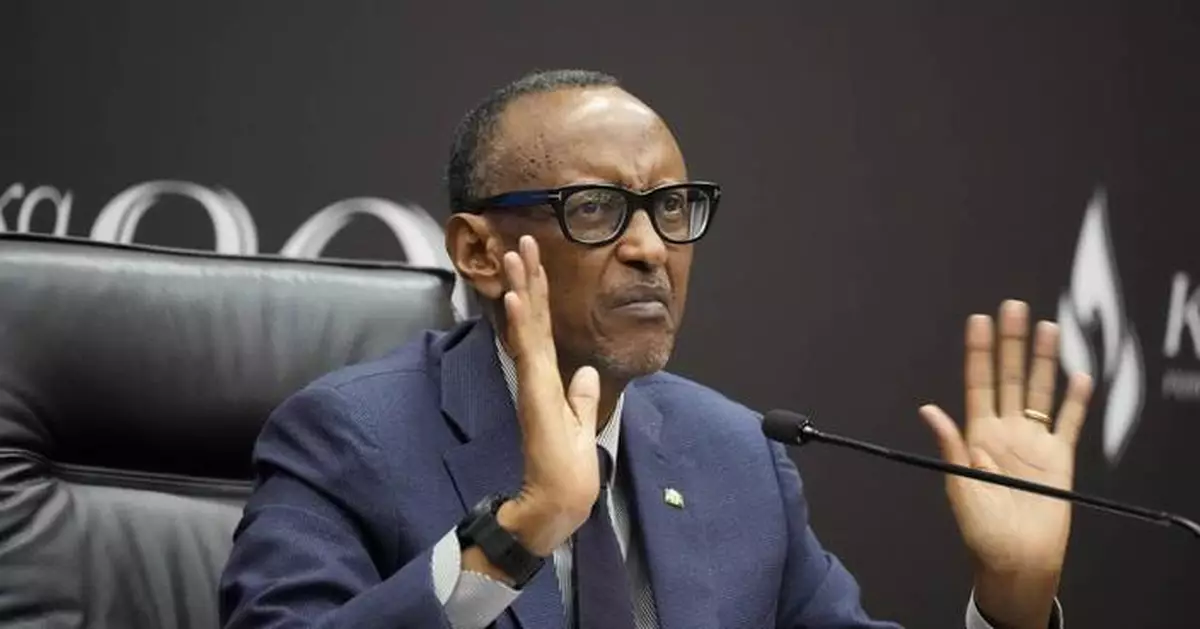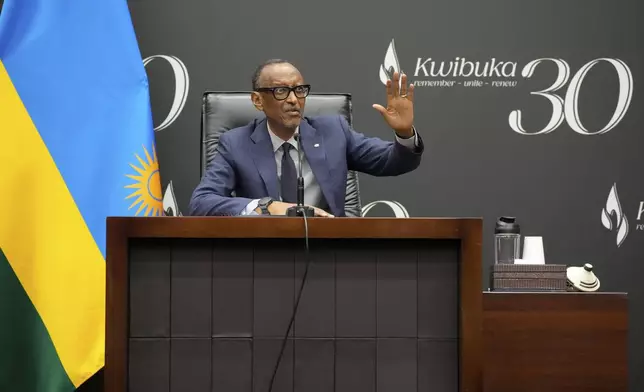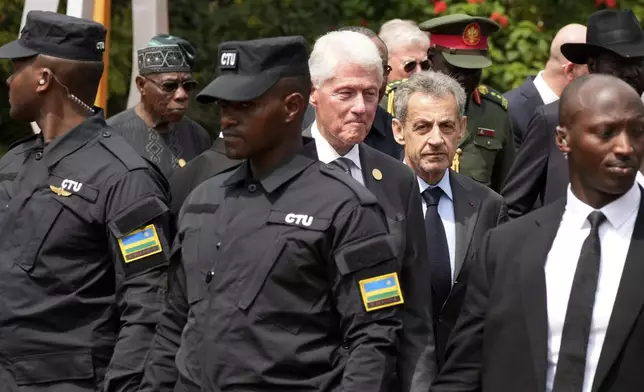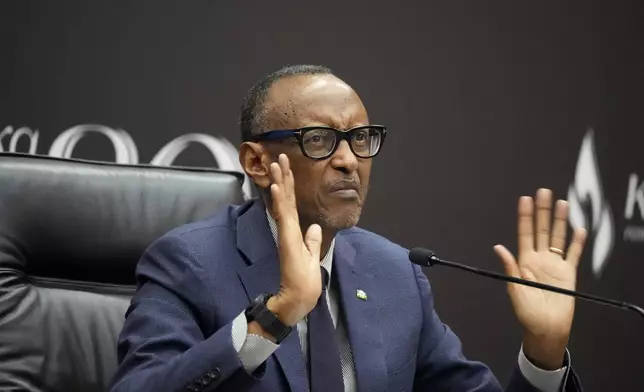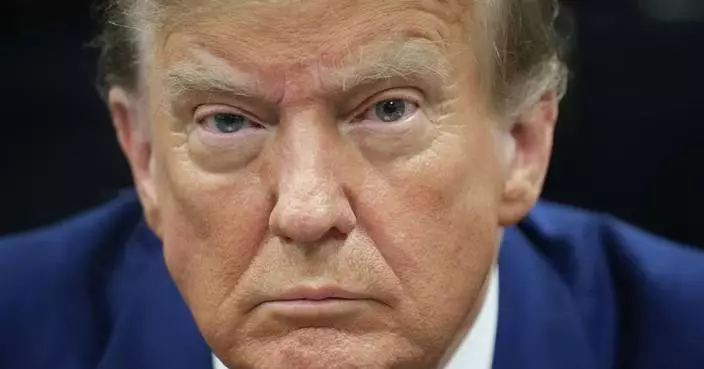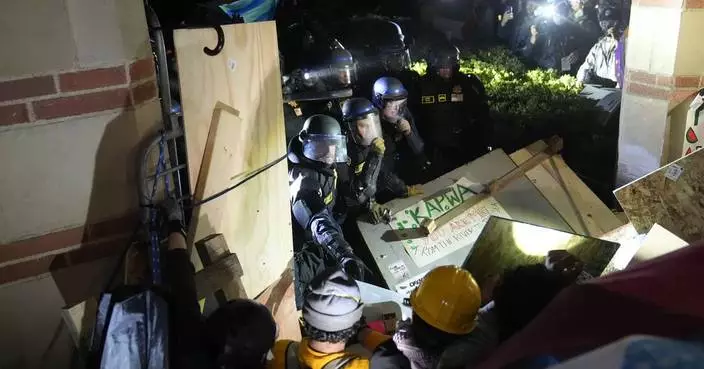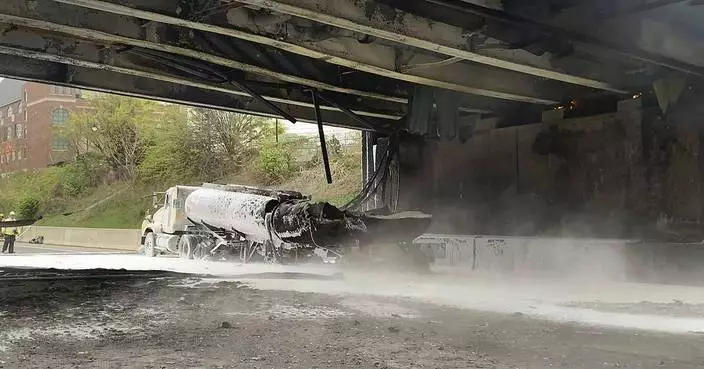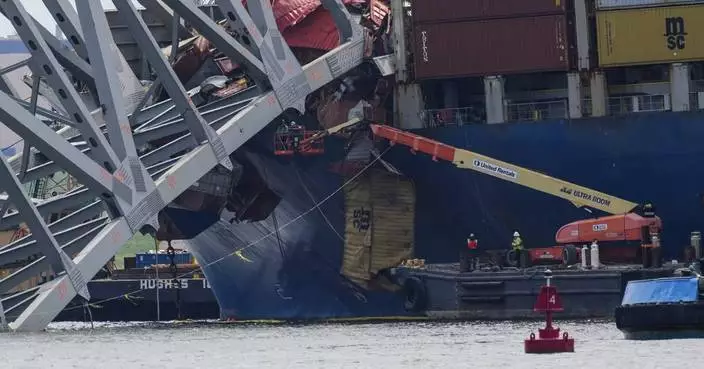KIGALI, Rwanda (AP) — Rwandan President Paul Kagame said Monday he was concerned by what he saw as a U.S. failure to characterize the 1994 massacres as a genocide against the country's minority Tutsis.
Kagame told reporters that the issue was an “element of discussion” in talks with former U.S. President Bill Clinton, who led the American delegation to a ceremony Sunday commemorating the 30th anniversary of the genocide in which Hutu extremists slaughtered about 800,000 people, most of them Tutsis, in a government-orchestrated campaign.
Click to Gallery
Former US President Bill Clinton, center left, and former President of France Nicolas Sarkozy, center right, leave after laying a wreath at the Kigali Genocide Memorial, in Kigali, Rwanda, Sunday, April 7, 2024. Rwandans are commemorating 30 years since the genocide in which an estimated 800,000 people were killed by government-backed extremists, shattering this small east African country that continues to grapple with the horrific legacy of the massacres. (AP Photo/Brian Inganga)
KIGALI, Rwanda (AP) — Rwandan President Paul Kagame said Monday he was concerned by what he saw as a U.S. failure to characterize the 1994 massacres as a genocide against the country's minority Tutsis.
Rwanda's President Paul Kagame gives a press conference at Kigali Convention Centre in Kigali, Rwanda, Monday, April 8, 2024. Rwandans are commemorating 30 years since the genocide in which an estimated 800,000 people were killed by government-backed extremists, shattering this small east African country that continues to grapple with the horrific legacy of the massacres. (AP Photo/Brian Inganga)
Rwanda's President Paul Kagame gives a press conference at Kigali Convention Centre in Kigali, Rwanda, Monday, April 8, 2024. Rwandans are commemorating 30 years since the genocide in which an estimated 800,000 people were killed by government-backed extremists, shattering this small east African country that continues to grapple with the horrific legacy of the massacres. (AP Photo/Brian Inganga)
Rwanda's President Paul Kagame gives a press conference at Kigali Convention Centre in Kigali, Rwanda, Monday, April 8, 2024. Rwandans are commemorating 30 years since the genocide in which an estimated 800,000 people were killed by government-backed extremists, shattering this small east African country that continues to grapple with the horrific legacy of the massacres. (AP Photo/Brian Inganga)
Rwanda's President Paul Kagame gives a press conference at Kigali Convention Centre in Kigali, Rwanda, Monday, April 8, 2024. Rwandans are commemorating 30 years since the genocide in which an estimated 800,000 people were killed by government-backed extremists, shattering this small east African country that continues to grapple with the horrific legacy of the massacres. (AP Photo/Brian Inganga)
Rwanda's President Paul Kagame leaves after a press conference at Kigali Convention Centre in Kigali, Rwanda, Monday, April 8, 2024. Rwandans are commemorating 30 years since the genocide in which an estimated 800,000 people were killed by government-backed extremists, shattering this small east African country that continues to grapple with the horrific legacy of the massacres. (AP Photo/Brian Inganga)
Rwanda's President Paul Kagame gestures as he gives a press conference at Kigali Convention Centre in Kigali, Rwanda, Monday, April 8, 2024. Rwandans are commemorating 30 years since the genocide in which an estimated 800,000 people were killed by government-backed extremists, shattering this small east African country that continues to grapple with the horrific legacy of the massacres. (AP Photo/Brian Inganga)
Former US President Bill Clinton, center left, and former President of France Nicolas Sarkozy, center right, leave after laying a wreath at the Kigali Genocide Memorial, in Kigali, Rwanda, Sunday, April 7, 2024. Rwandans are commemorating 30 years since the genocide in which an estimated 800,000 people were killed by government-backed extremists, shattering this small east African country that continues to grapple with the horrific legacy of the massacres. (AP Photo/Brian Inganga)
Rwanda's President Paul Kagame gestures as he gives a press conference at Kigali Convention Centre in Kigali, Rwanda, Monday, April 8, 2024. Rwandans are commemorating 30 years since the genocide in which an estimated 800,000 people were killed by government-backed extremists, shattering this small east African country that continues to grapple with the horrific legacy of the massacres. (AP Photo/Brian Inganga)
Many Rwandans criticized U.S. Secretary of State Antony Blinken for failing to specify that the genocide targeted the Tutsis when he wrote late Sunday: “We mourn the many thousands of Tutsis, Hutus, Twas, and others whose lives were lost during 100 days of unspeakable violence."
Responding to a journalist's question about Blinken's post on the social platform X, Kagame said he believed he had reached an agreement with U.S. authorities a decade ago for them not to voice any criticism on the genocide anniversary.
“Give us that day,” he said, adding that criticism over “everything we are thought not to have at all" is unwanted on the genocide anniversary.
Rwandan authorities insist any ambiguity on who the genocide victims were is an attempt to distort history and disrespects the memory of the victims.
U.S. officials did not comment on Monday. President Joe Biden issued a statement Sunday, saying, “We will never forget the horrors of those 100 days, the pain and loss suffered by the people of Rwanda, or the shared humanity that connects us all, which hate can never overcome.”
“In the 100 days that followed, more than 800,000 women, men, and children were murdered. Most were ethnic Tutsis; some were Hutus and Twa people. It was a methodical mass extermination, turning neighbor against neighbor, and decades later, its repercussions are still felt across Rwanda and around the world,” Biden wrote.
“We honor the victims who died senselessly and the survivors who courageously rebuilt their lives. And we commend all Rwandans who have contributed to reconciliation and justice efforts, striving to help their nation bind its wounds, heal its trauma, and build a foundation of peace and unity. Those efforts continue to this day.”
The question of how to memorialize the genocide stems from allegations that the Rwandan Patriotic Front — the rebel group that stopped the massacres and has ruled Rwanda unchallenged since 1994 — carried out its own revenge killings during and after the genocide.
Kagame has previously said that his forces showed restraint. He said in a speech Sunday that Rwandans are disgusted by what he described as the hypocrisy of Western nations that failed to stop the genocide.
The genocide was ignited when a plane carrying then-President Juvénal Habyarimana, a Hutu, was shot down over Kigali on April 6, 1994. The Tutsis were blamed for downing the plane and killing the president, and became targets in massacres led by Hutu extremists that lasted over 100 days. Some moderate Hutus who tried to protect members of the Tutsi minority were also killed.
As part of weeklong commemorations, flags flew at half-staff and public places across Rwanda were told to keep entertainment quiet.
Rwandan authorities also face questions over how to present commemoration activities in a way that acknowledges the efforts of some Hutus to protect their Tutsi neighbors.
“You see, those who are denying the genocide are saying, ’Ah, to commemorate? It’s a big serious barrier to unity. We have to move forward, to forget about commemoration,'" said Naphtal Ahishakiye, executive secretary of a prominent group of genocide survivors in Kigali. “Those are wrong. They have genocide ideology. They don’t want to remember what happened.”
The government has long blamed the international community for ignoring warnings about the killings, and some Western leaders have expressed regret.
French President Emmanuel Macron said last week that France and its allies could have stopped the genocide but lacked the will to do so. Macron’s declaration came three years after he acknowledged the “overwhelming responsibility” of France — Rwanda’s closest European ally in 1994 — for failing to stop Rwanda’s slide into the slaughter.
Although Kagame is a U.S. ally and has friendly relations with many Western leaders, he is under growing pressure over Rwanda's military involvement in eastern Congo, where tensions have flared recently as the two countries' leaders accuse one another of supporting armed groups. In February, the U.S. urged Rwanda to withdrawal its troops and missile systems from eastern Congo, for the first time describing the M23 as a Rwanda-backed rebel group.
U.N. experts have said they had “solid evidence” that members of Rwanda’s armed forces were conducting operations there in support of M23, whose rebellion has caused the displacement of hundreds of thousands of people in Congo’s North Kivu’s province.
Kagame said Monday that the M23 are fighting for the rights of Congolese Tutsis, with at least 100,000 of them now seeking shelter in Rwanda after fleeing attacks in eastern Congo.
Rwandan authorities say they want to deter rebels, including Hutu extremists responsible for the genocide, who fled to eastern Congo.
Rwanda’s ethnic composition remains largely unchanged since 1994, with a Hutu majority. The Tutsis account for 14% and the Twa just 1% of Rwanda’s 14 million people.
Kagame’s Tutsi-dominated government has outlawed any form of organization along ethnic lines, as part of efforts to build a uniform Rwandan identity. National ID cards no longer identify citizens by ethnic group, and authorities imposed a tough penal code to prosecute those suspected of denying the genocide or the “ideology” behind it.
But some observers say the law has been used to silence critics who question the government’s policies, including how to build lasting unity and reconciliation.
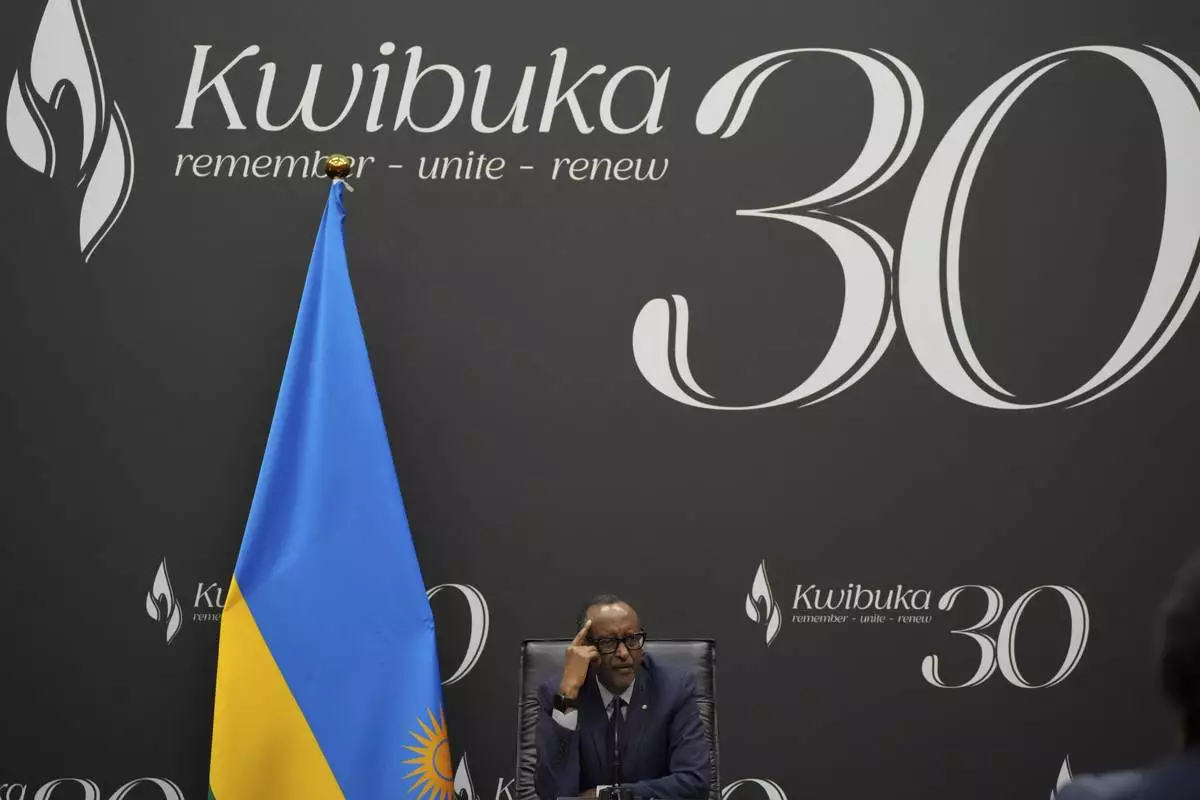
Rwanda's President Paul Kagame gives a press conference at Kigali Convention Centre in Kigali, Rwanda, Monday, April 8, 2024. Rwandans are commemorating 30 years since the genocide in which an estimated 800,000 people were killed by government-backed extremists, shattering this small east African country that continues to grapple with the horrific legacy of the massacres. (AP Photo/Brian Inganga)
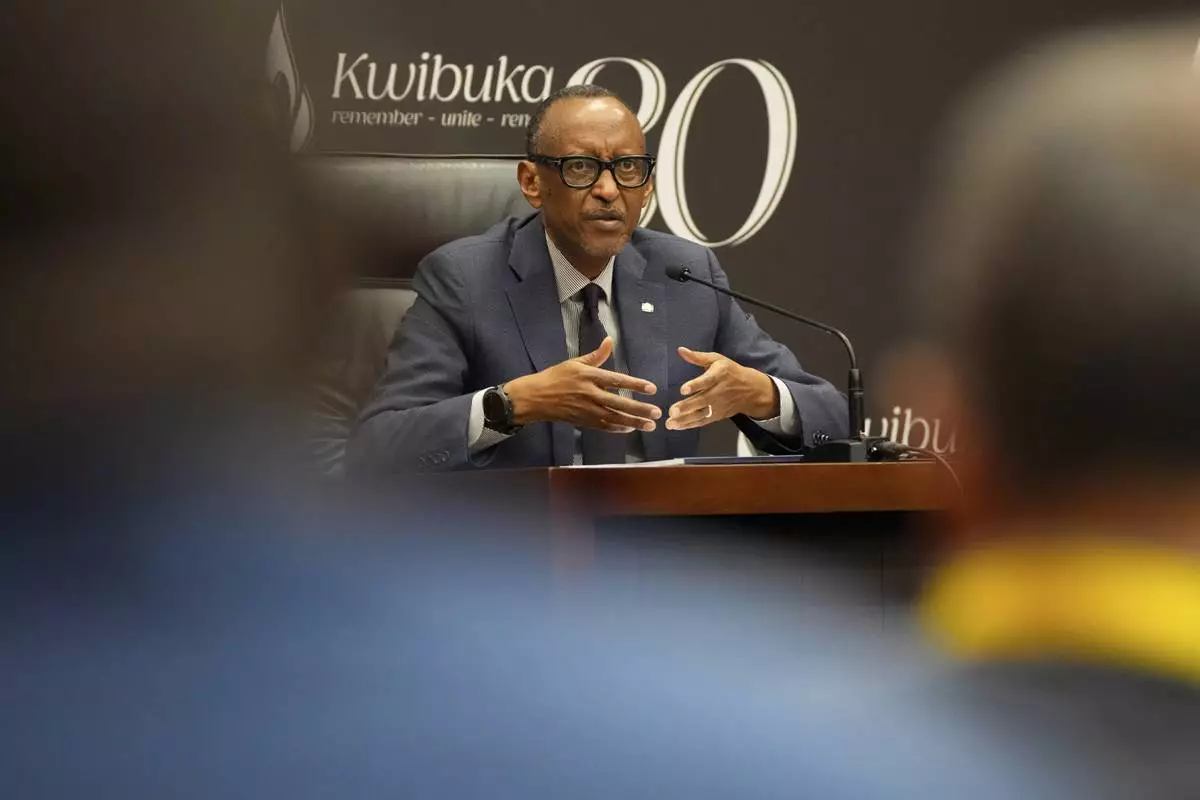
Rwanda's President Paul Kagame gives a press conference at Kigali Convention Centre in Kigali, Rwanda, Monday, April 8, 2024. Rwandans are commemorating 30 years since the genocide in which an estimated 800,000 people were killed by government-backed extremists, shattering this small east African country that continues to grapple with the horrific legacy of the massacres. (AP Photo/Brian Inganga)
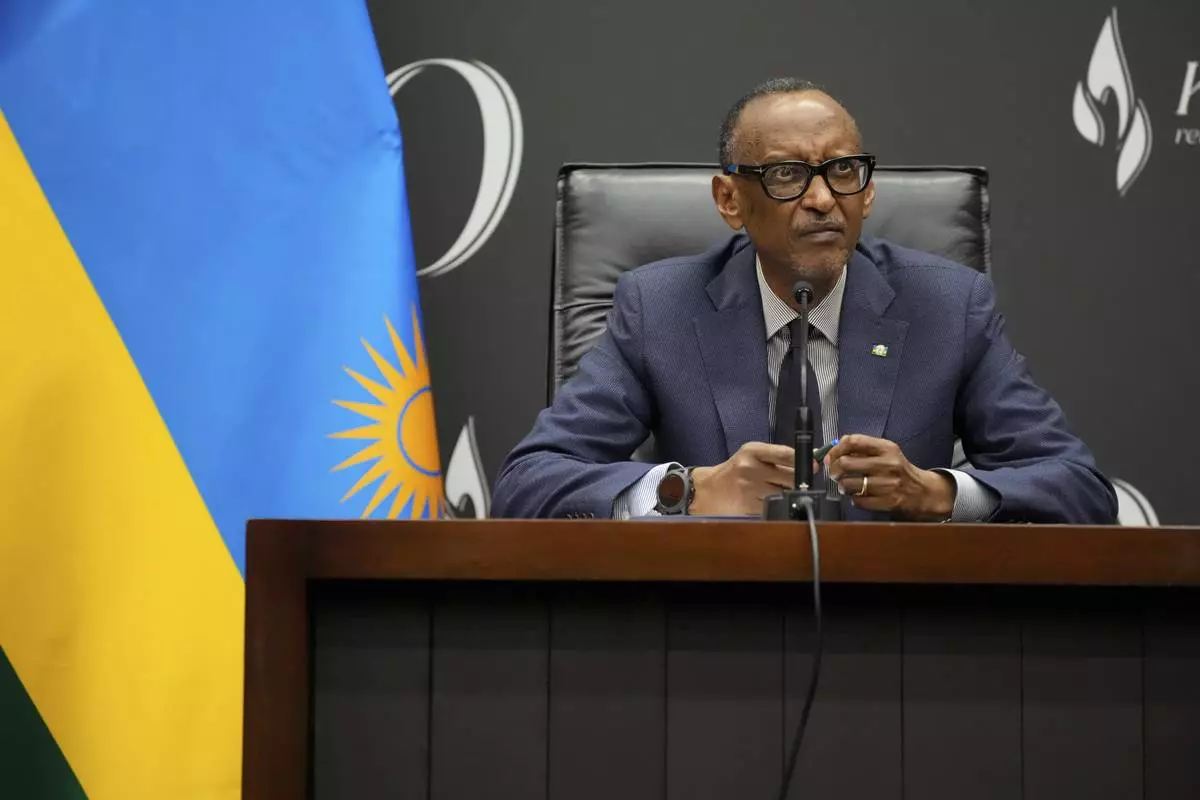
Rwanda's President Paul Kagame gives a press conference at Kigali Convention Centre in Kigali, Rwanda, Monday, April 8, 2024. Rwandans are commemorating 30 years since the genocide in which an estimated 800,000 people were killed by government-backed extremists, shattering this small east African country that continues to grapple with the horrific legacy of the massacres. (AP Photo/Brian Inganga)
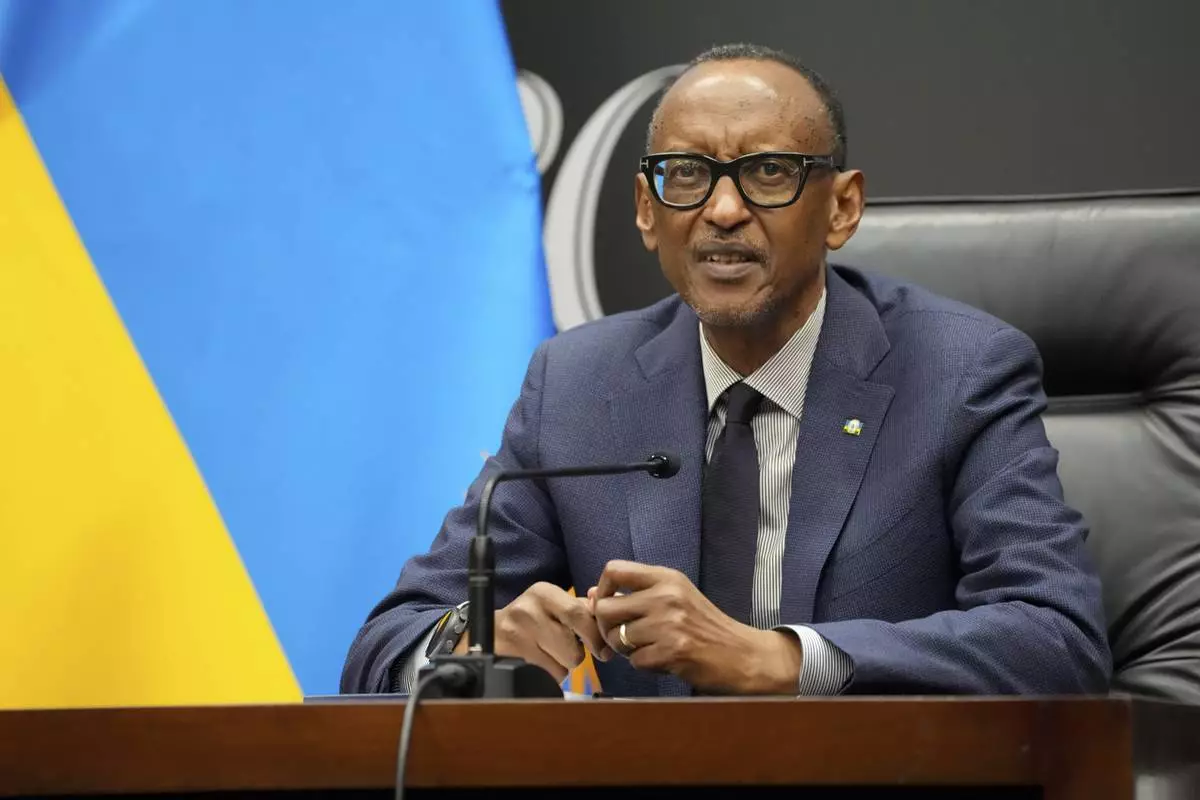
Rwanda's President Paul Kagame gives a press conference at Kigali Convention Centre in Kigali, Rwanda, Monday, April 8, 2024. Rwandans are commemorating 30 years since the genocide in which an estimated 800,000 people were killed by government-backed extremists, shattering this small east African country that continues to grapple with the horrific legacy of the massacres. (AP Photo/Brian Inganga)
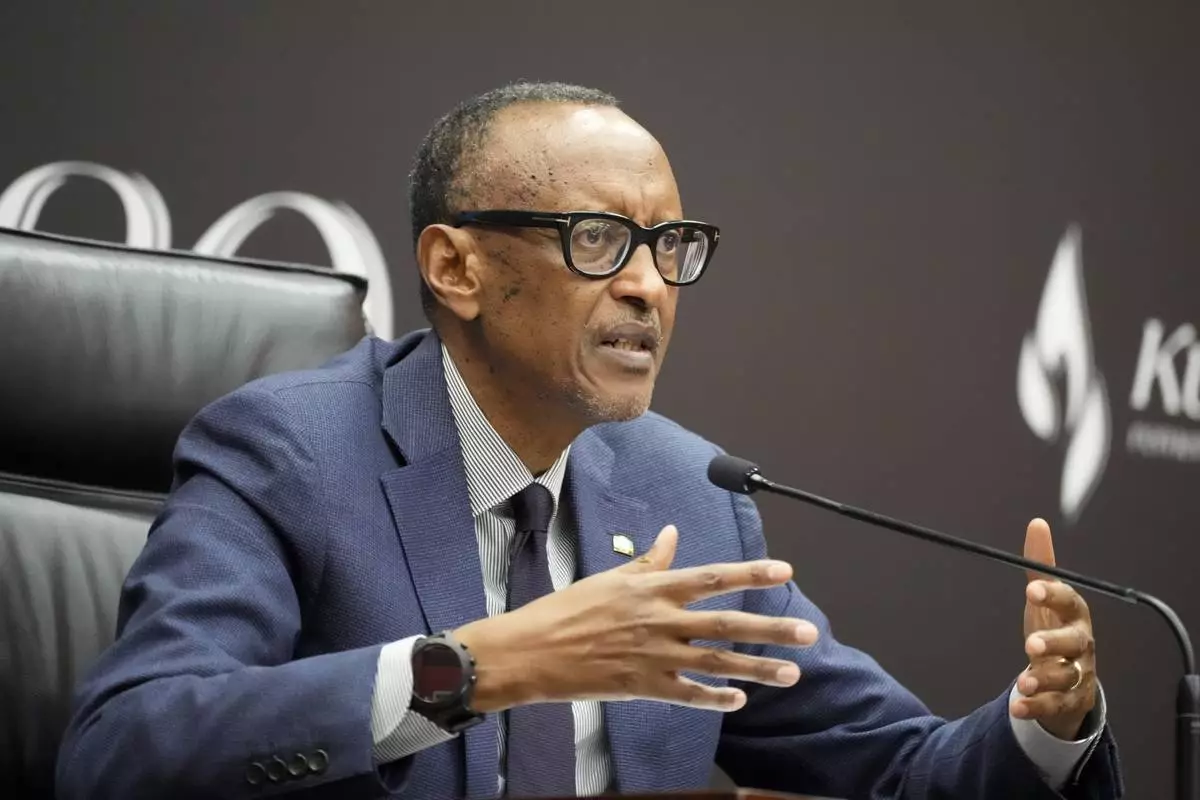
Rwanda's President Paul Kagame gives a press conference at Kigali Convention Centre in Kigali, Rwanda, Monday, April 8, 2024. Rwandans are commemorating 30 years since the genocide in which an estimated 800,000 people were killed by government-backed extremists, shattering this small east African country that continues to grapple with the horrific legacy of the massacres. (AP Photo/Brian Inganga)
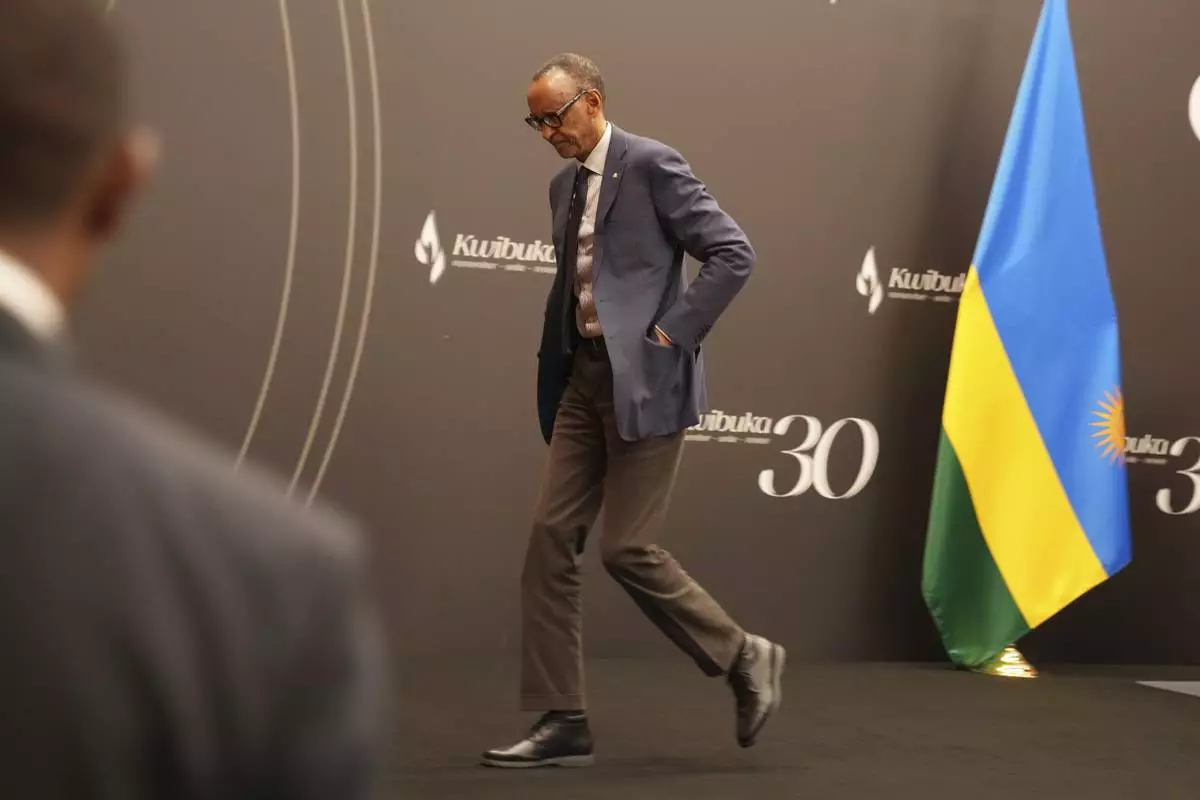
Rwanda's President Paul Kagame leaves after a press conference at Kigali Convention Centre in Kigali, Rwanda, Monday, April 8, 2024. Rwandans are commemorating 30 years since the genocide in which an estimated 800,000 people were killed by government-backed extremists, shattering this small east African country that continues to grapple with the horrific legacy of the massacres. (AP Photo/Brian Inganga)

Rwanda's President Paul Kagame gestures as he gives a press conference at Kigali Convention Centre in Kigali, Rwanda, Monday, April 8, 2024. Rwandans are commemorating 30 years since the genocide in which an estimated 800,000 people were killed by government-backed extremists, shattering this small east African country that continues to grapple with the horrific legacy of the massacres. (AP Photo/Brian Inganga)

Former US President Bill Clinton, center left, and former President of France Nicolas Sarkozy, center right, leave after laying a wreath at the Kigali Genocide Memorial, in Kigali, Rwanda, Sunday, April 7, 2024. Rwandans are commemorating 30 years since the genocide in which an estimated 800,000 people were killed by government-backed extremists, shattering this small east African country that continues to grapple with the horrific legacy of the massacres. (AP Photo/Brian Inganga)

Rwanda's President Paul Kagame gestures as he gives a press conference at Kigali Convention Centre in Kigali, Rwanda, Monday, April 8, 2024. Rwandans are commemorating 30 years since the genocide in which an estimated 800,000 people were killed by government-backed extremists, shattering this small east African country that continues to grapple with the horrific legacy of the massacres. (AP Photo/Brian Inganga)
WASHINGTON (AP) — President Joe Biden on Thursday defended the right to protest but insisted that “order must prevail” as college campuses across the country face unrest over the war in Gaza.
“Dissent is essential for democracy," he said at the White House. "But dissent must never lead to disorder.”
Tensions have been building for days as demonstrators refuse to remove campus encampments and administrators turn to police to clear them by force, leading to clashes that have seized attention from politicians and the media.
Biden said he did not support calls to send in the National Guard. He also said that the protests have not prompted him to reconsider his approach to the war. The Democratic president has occasionally criticized Israel's conduct but continued to supply it with weapons.
His remarks, occurring shortly before he left the White House for a trip to North Carolina, came after days of silence about the protests. Republicans have tried to turn the scenes of unrest into a campaign cudgel, and Biden said he rejected efforts to use the situation to “score political points.”
“This isn’t a moment for politics," he said. "It’s a moment for clarity.”
Biden's last previous public comment on the protests came more than a week ago, when he condemned “antisemitic protests” and “those who don’t understand what’s going on with the Palestinians.”
The White House, which has been peppered with questions by reporters, had gone only slightly further than the president. On Wednesday, press secretary Karine Jean-Pierre said Biden is “monitoring the situation closely," and she said some demonstrations had stepped over a line that separated free speech from unlawful behavior.
“Forcibly taking over a building," such as what happened at Columbia University in New York, "is not peaceful," she said. "It’s just not.”
Biden has never been much for protesting. His career in elected office began as a county official when he was only 28 years old, and he’s always espoused the political importance of compromise over zealousness.
As college campuses convulsed with anger over the Vietnam War in 1968, Biden was in law school at Syracuse University.
“I’m not big on flak jackets and tie-dyed shirts,” he said years later. “You know, that’s not me.″
Despite the White House's criticism and Biden's refusal to heed protesters' demands to cut off U.S. support for Israel, Republicans blame Democrats for the disorder and have used it as a backdrop for press conferences.
“We need the president of the United States to speak to the issue and say this is wrong," House Speaker Mike Johnson, a Louisiana Republican, said on Tuesday. "What’s happening on college campuses right now is wrong.”
Johnson visited Columbia with other members of his caucus last week. House Republicans sparred with protesters while speaking to the media at George Washington University in Washington, D.C., on Wednesday.
Former President Donald Trump, his party's presumptive nominee, also criticized Biden in an interview with Sean Hannity on Fox News.
“Biden has to do something,” he said. “Biden is supposed to be the voice of our country, and it’s certainly not much of a voice. It’s a voice that nobody’s heard.”
He repeated his criticisms on Wednesday during a campaign event in Waukesha, Wisconsin.
“The radical extremists and far-left agitators are terrorizing college campuses, as you possibly noticed," Trump said. “And Biden’s nowhere to be found. He hasn’t said anything."
Kate Berner, who served as deputy communications director for Biden’s campaign in 2020, said Republicans already tried the same tactic four years ago during protests over George Floyd’s murder by a police officer.
“People rejected that,” she said. “They saw that it was just fearmongering. They saw that it wasn’t based in reality.”
Apart from condemning antisemitism, the White House has been reluctant to directly engage on the issue.
Jean-Pierre repeatedly deflected questions during a briefing on Monday.
Asked whether protesters should be disciplined by their schools, she said “universities and colleges make their own decisions” and "we’re not going to weigh in from here.”
Pressed on whether police should be called in, she said “that's up to the colleges and universities.”
When quizzed about administrators rescheduling graduation ceremonies, she said “that is a decision that they have to decide" and “that is on them.”
Biden will make his own visit to a college campus on May 19 when he's scheduled to deliver the commencement address at Morehouse University in Atlanta.
Associated Press writer Adriana Gomez Licon in Miami and AP writer Colleen Long and White House Correspondent Zeke Miller in Washington contributed to this report.
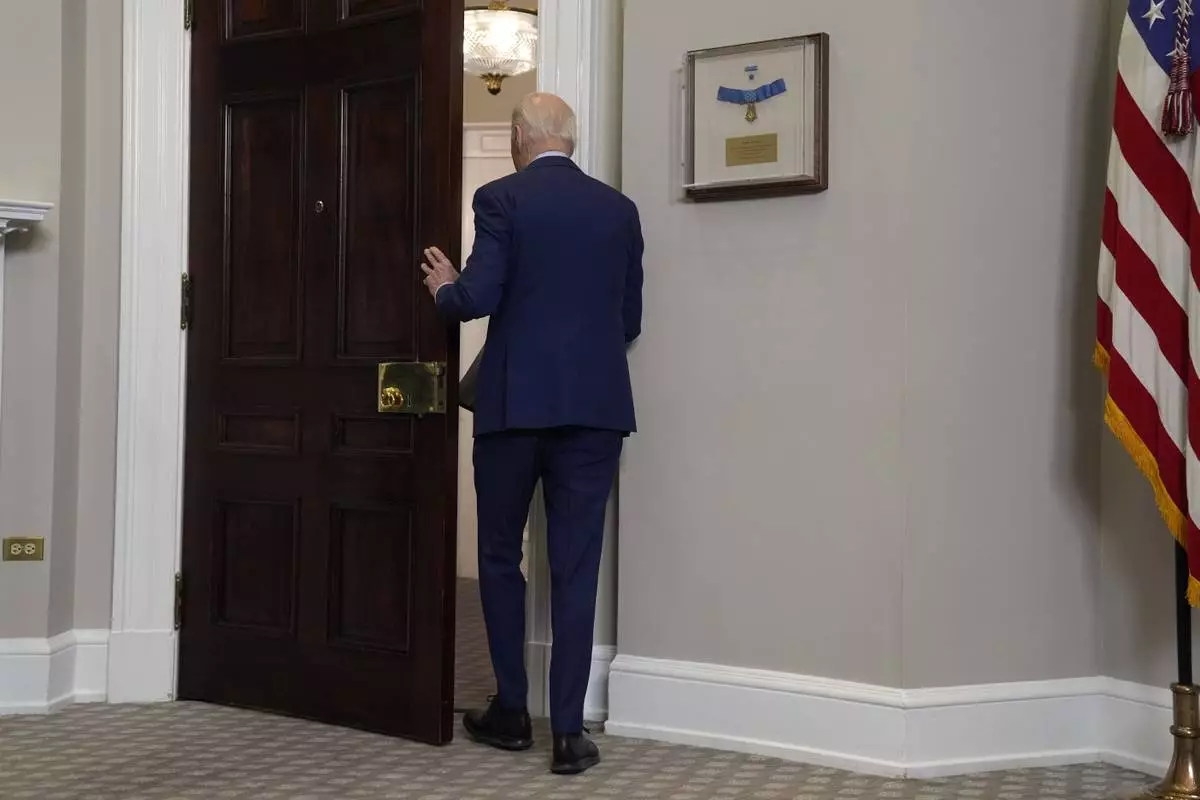
President Joe Biden departs after delivering remarks about student protests over the war in Gaza, from the Roosevelt Room of the White House, Thursday, May 2, 2024, in Washington. (AP Photo/Evan Vucci)
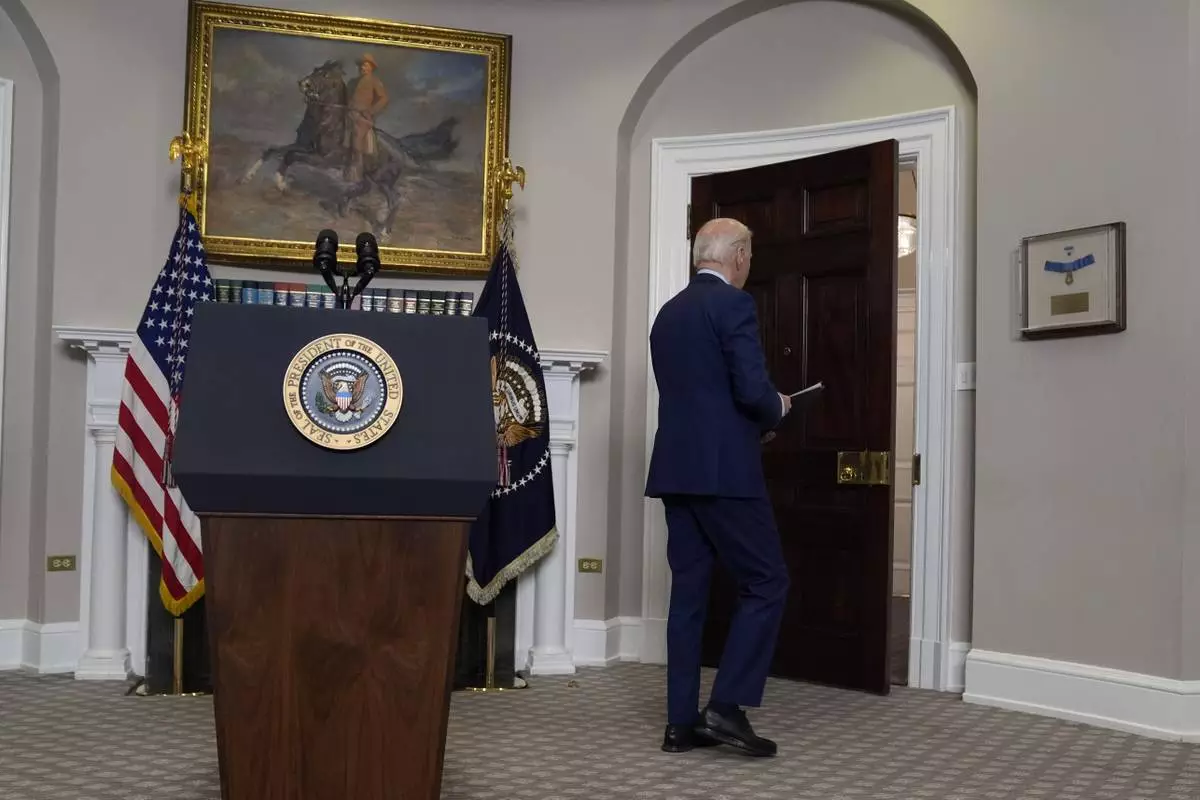
President Joe Biden departs after delivering remarks about student protests over the war in Gaza, from the Roosevelt Room of the White House, Thursday, May 2, 2024, in Washington. (AP Photo/Evan Vucci)
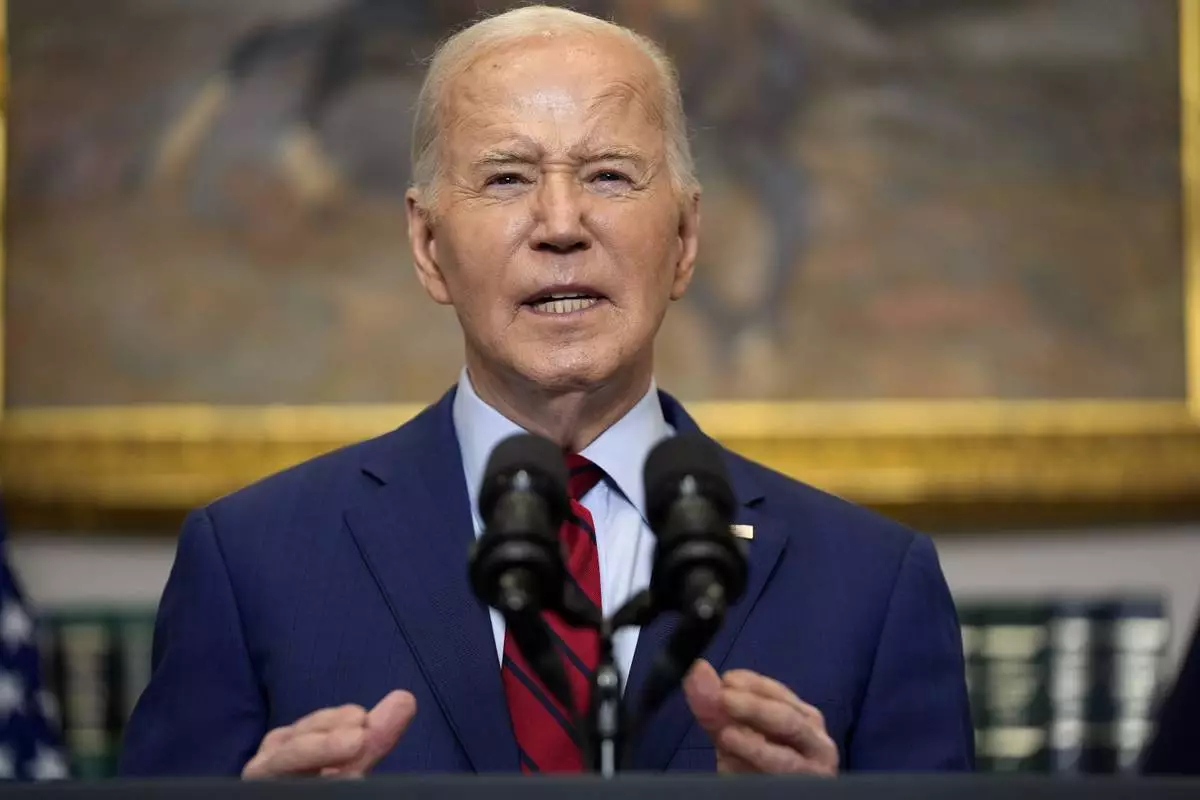
President Joe Biden delivers remarks about student protests over the war in Gaza, from the Roosevelt Room of the White House, Thursday, May 2, 2024, in Washington. (AP Photo/Evan Vucci)
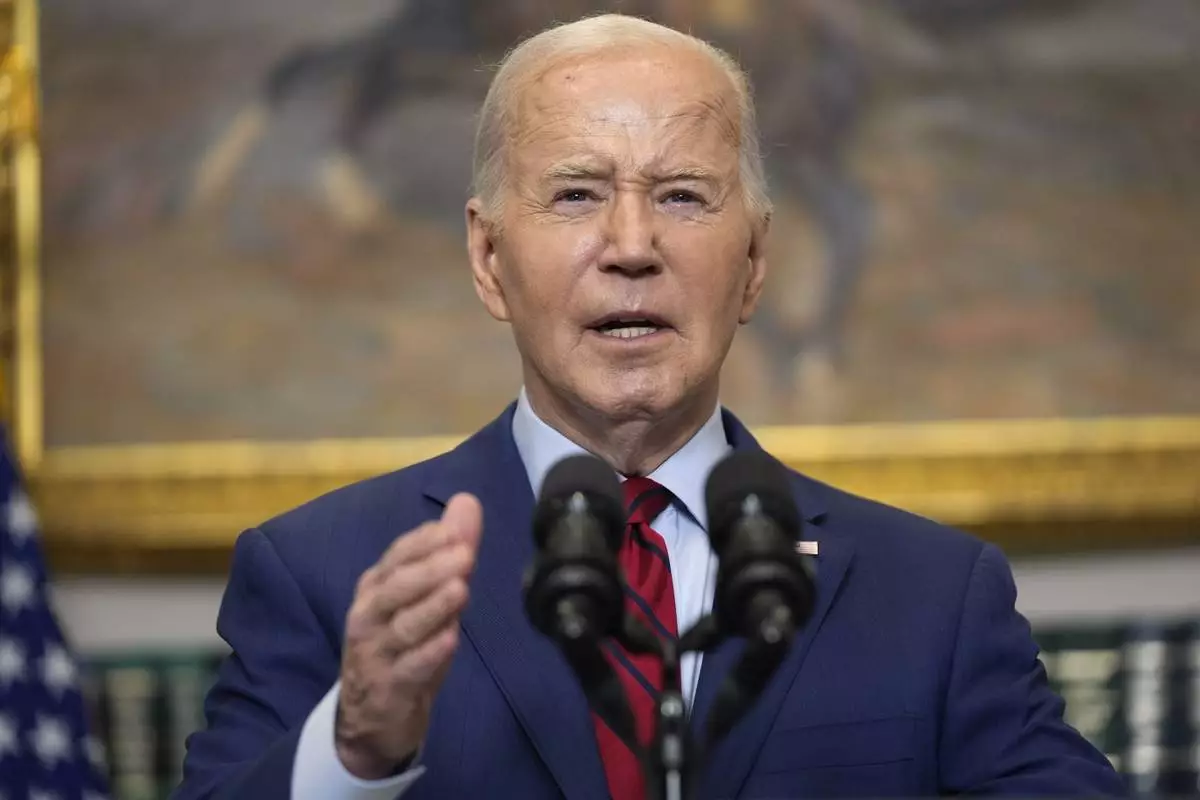
President Joe Biden delivers remarks about student protests over the war in Gaza, from the Roosevelt Room of the White House, Thursday, May 2, 2024, in Washington. (AP Photo/Evan Vucci)
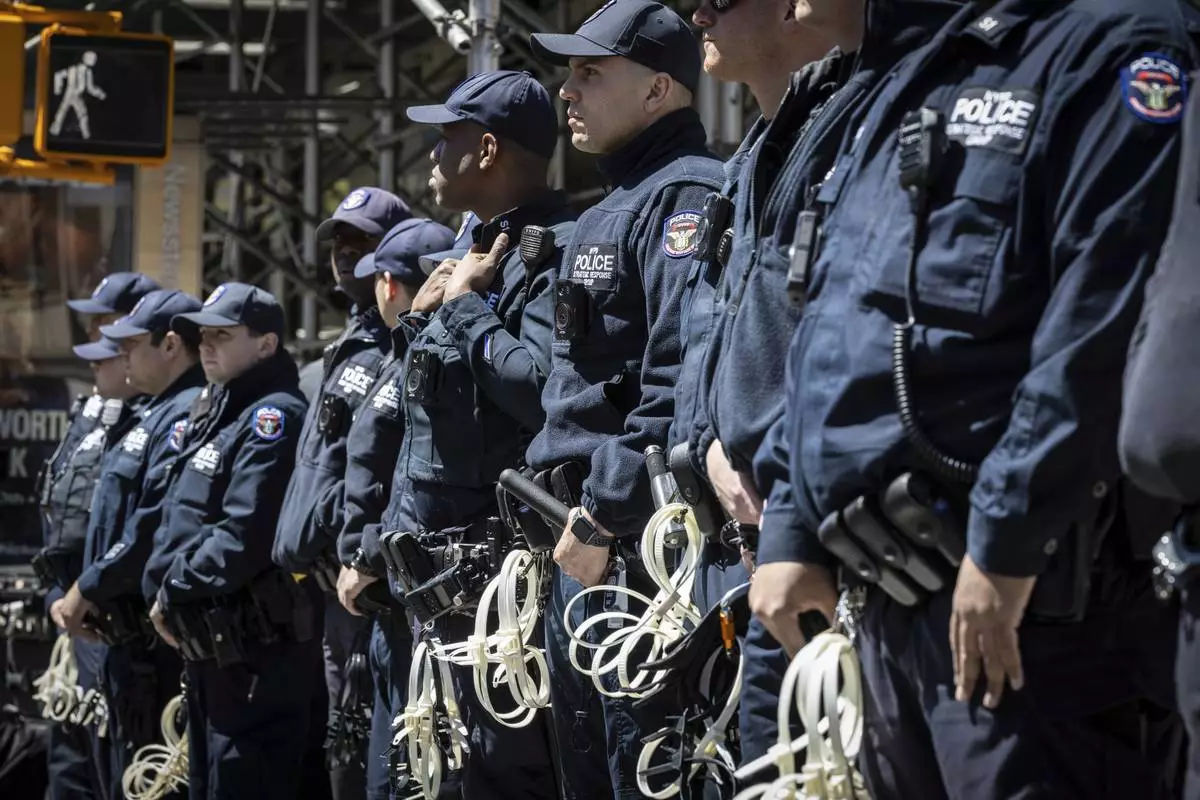
NYPD officers from the Strategic Response Group form a wall of protection around Deputy Commissioner of Legal Matters Michael Gerber and Deputy Commissioner of Operations Kay Daughtry, not in the picture, during a press conference regarding the ongoing pro-Palestinians protest encampment at Columbia University in New York on Monday, April 22, 2024. (AP Photo/Stefan Jeremiah)
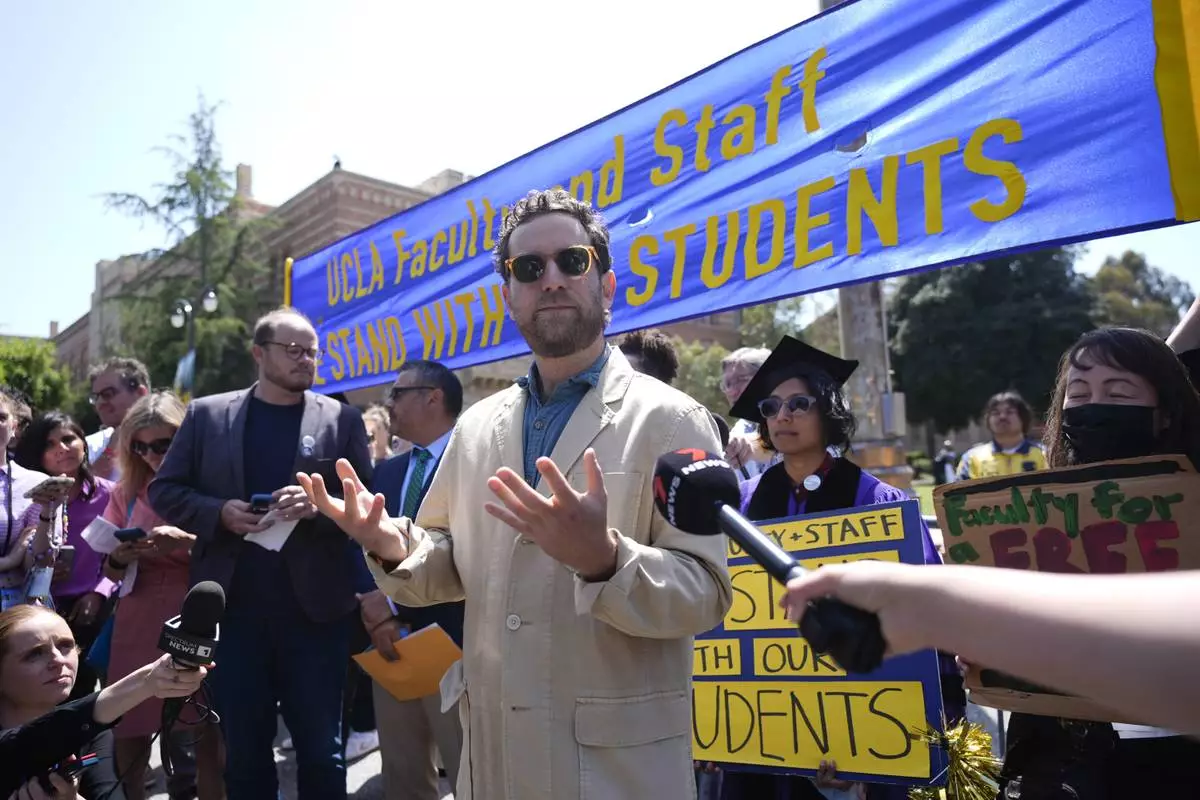
UCLA professor Nick Shapiro speaks at a news conference on the UCLA campus, after nighttime clashes between Pro-Israel and Pro-Palestinian groups, Wednesday, May 1, 2024, in Los Angeles. (AP Photo/Jae C. Hong)
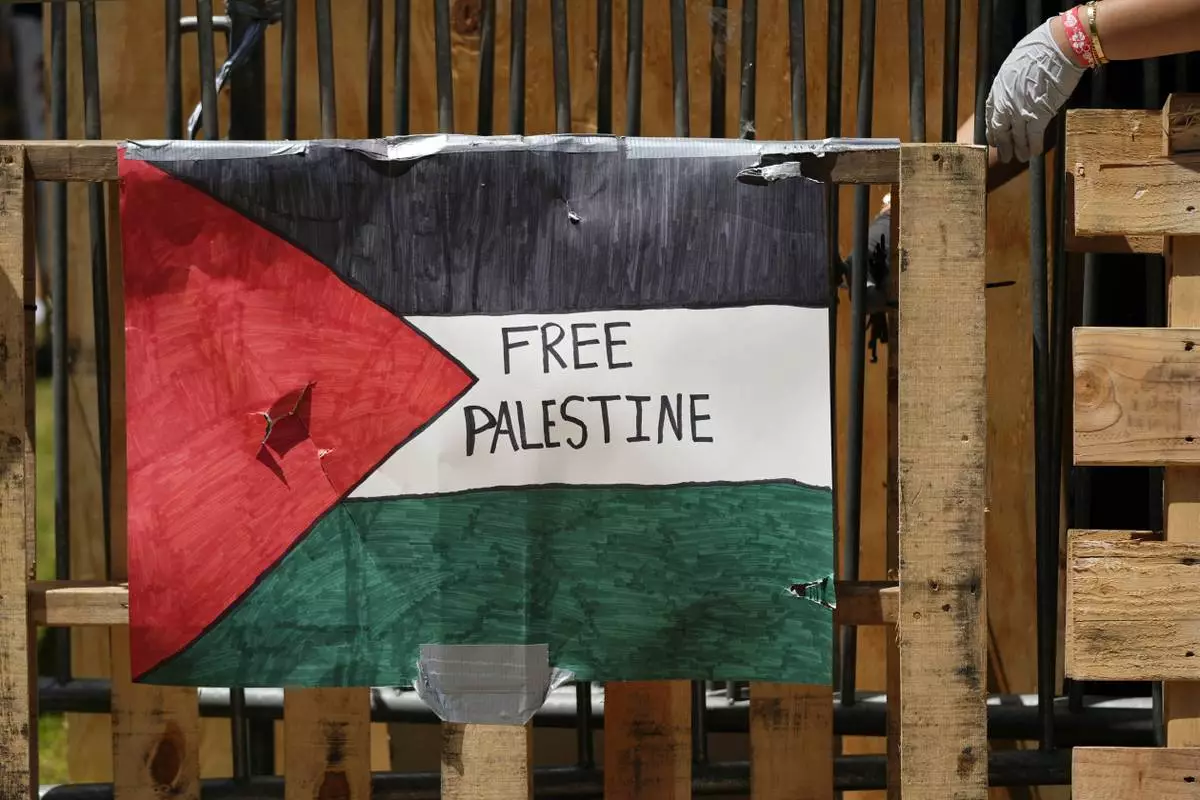
A pro Palestinians sign is shown on the UCLA campus, the morning after clashes between Pro-Israel and Pro-Palestinian groups, Wednesday, May 1, 2024, in Los Angeles. (AP Photo/Jae C. Hong)

Pro-Palestine student activists face off with New York Police Department officers during a raid on Columbia University's campus at the request of Columbia University President Minouche Shafik on Tuesday evening, April 30, 2024 in New York. NYPD officers, including those from the police department's Strategic Response Group, arrested approximately 100 people as they dismantled encampments and removed individuals occupying Hamilton Hall. (Seyma Bayram via AP)
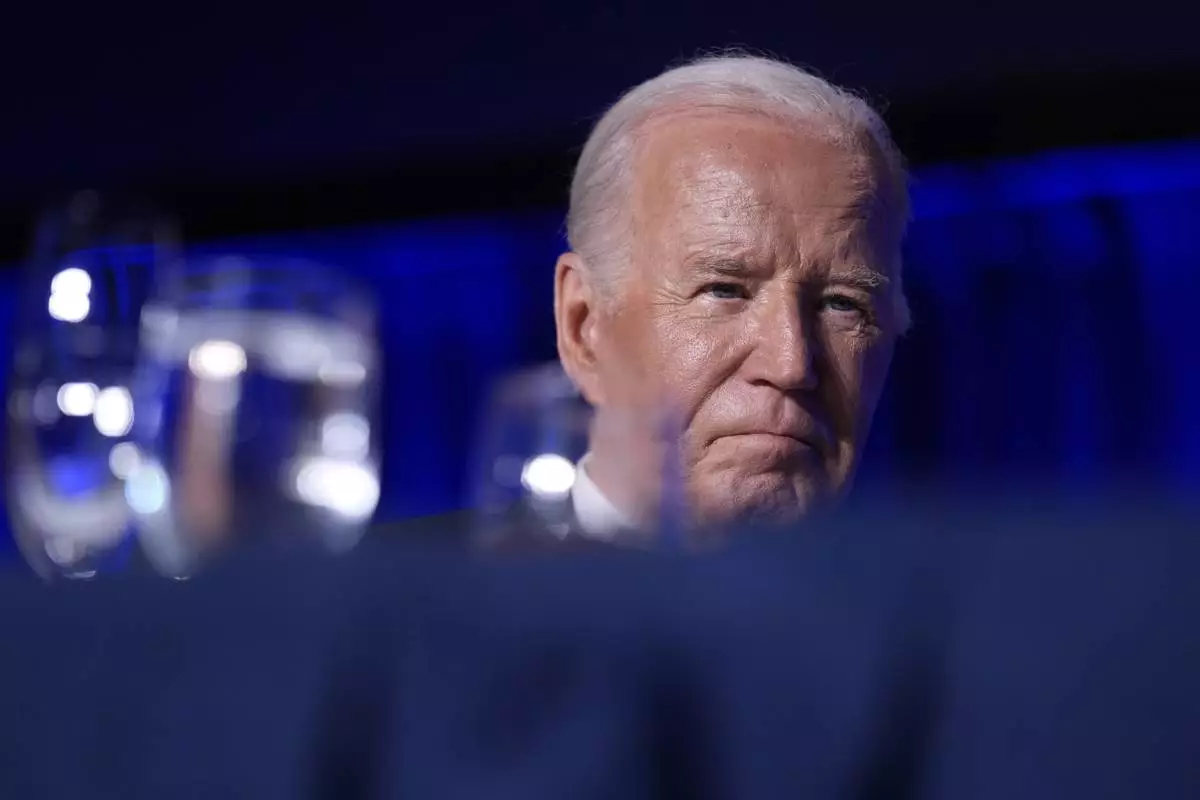
President Joe Biden attends the White House Correspondents' Association Dinner at the Washington Hilton, Saturday, April 27, 2024, in Washington. (AP Photo/Manuel Balce Ceneta)











